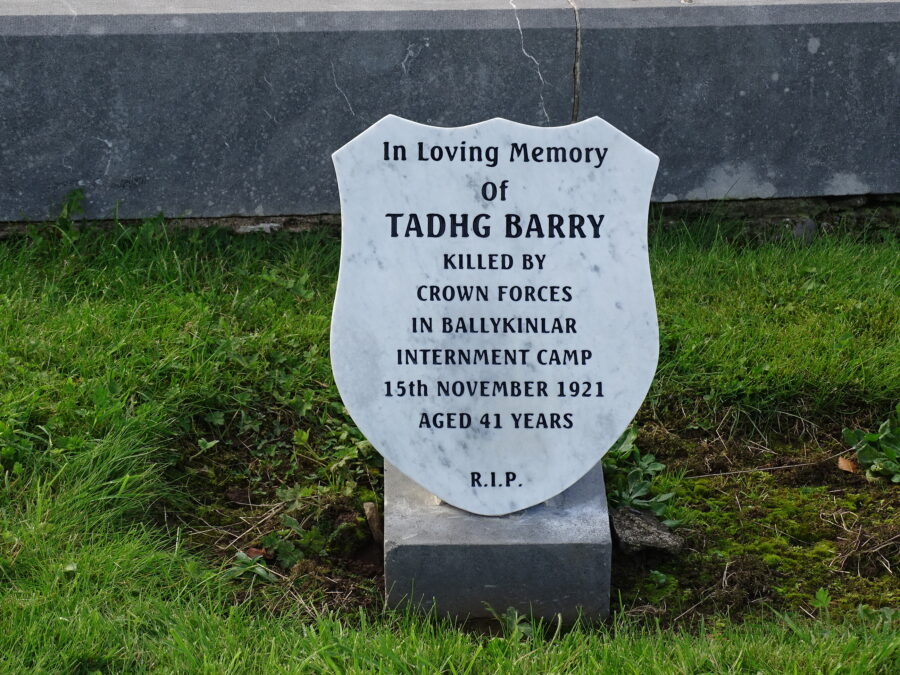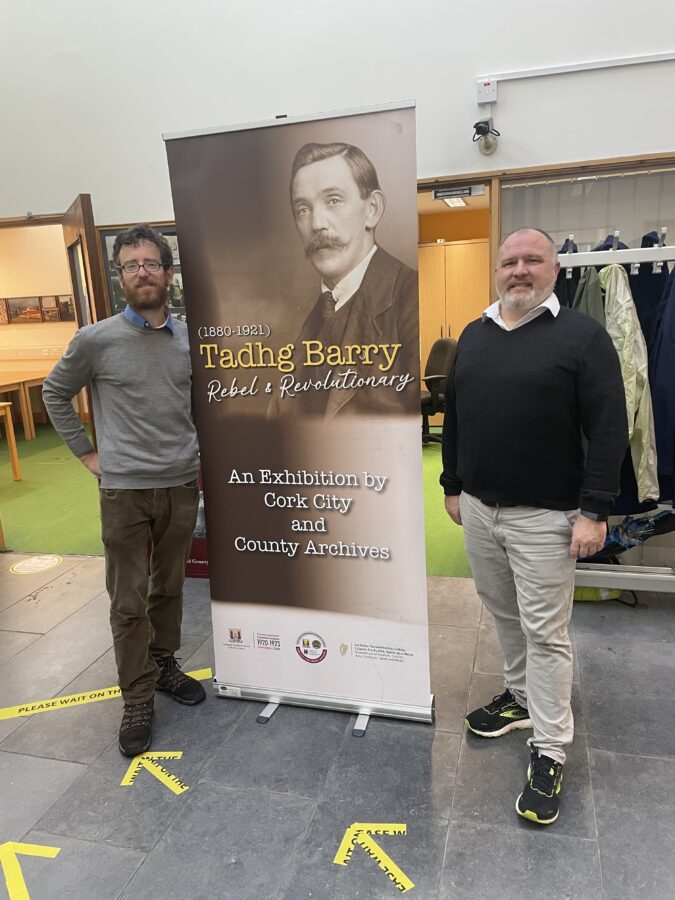
Kieran’s Our City, Our Town Article,
Cork Independent, 25 November 2021
Journeys to a Truce: The Green Flag of Tadhg Barry
On Saturday 19 November 1921 at 1pm the remains of Tadhg Barry were removed from Ballykinlar camp hospital, County Down where they had lain since the day of his tragic shooting, and placed into a motor car hearse and waited for transport to Dublin. The coffin, which was covered with a republican flag, was borne on the shoulders of the Lord Mayor of Cork, Donal Óg O’Callaghan, J J Walsh, Liam De Róiste, Commandant Michael Staines, Councillor Robert Day from Cork Corporation, a member representing the President of the Irish Transport and General Workers Union, and Commandant Seamus Woods, representing the 3rd Northern Division IRA. Patrick Barry, the brother of the deceased, was chief mourner.
The Cork Examiner outlines the journey of Tadhg’s body back to Cork. It outlines that there was a large contingent of laity present from Downpatrick, Newcastle, Newry, Dundrum, and surrounding districts and hundreds of the internees watched the solemn oppressive proceedings from behind the wire barbed wire position.
At the nearby Tullymurry Cross the funeral was met with motor cars of sympathisers, who accompanied it as far as Newry. Between this point and the camp a large body of armed military were met on the road. They marched past with arms reversed out of respect to the dead, but a few of them groaned and ‘boohed’ on seeing the Republican colours on the coffin. This was the only unseemly incident noticeable on the journey to Dublin. The funeral travelled onto Newry via a number of settlements. At each people lined the streets.
At Newry, the cortege passed through the town to the mournful peeling of its cathedral’s bbell. It was headed by the Sinn Féin flag and an advance party of volunteers of the Newry battalion IRA. After the advance party of the area came the Newry War Pipers band playing “Wrap the Green Flag around me” in semi-quick time. They were followed by a large body of volunteers. Behind the motor car hearse, there came a large number of priests from the parochial house and outside districts. Business was suspended within all the Roman Catholic establishments in the town.
Travelling on, the motor hearse was met at Drumcondra, Dublin by a huge procession consisting of representatives of Dáil Éireann. Irish public bodies and organisations, volunteers and trades bodies. The procession moved slowly to St Mary’s Pro Cathedral where the bodyguard of the volunteers remained until the morning. Shops closed early and train services were temporary stopped while the funeral procession passed through the area.
On the following morning after the subsequent mass in the Pro-Cathedral the remains of Tadhg were sent to Cork by train. They arrived on Saturday afternoon, 20 November at 2.55pm. Long before the train arrived at Cork’s Lower Glanmire Road terminus the area of the station was thronged with people especially members of the IRA company to which Tadhg was attached to.
Tadhg’s coffin was covered with a republican flag and was borne on the shoulders of volunteers. Companies of volunteers from various parts of the county formed up along MacCurtain Street and followed the coffin to the cathedral. As requested, the shopkeepers in McCurtain Street closed their premises when the cortege was passing. Many people wore mourning badges.
Thousands of the public lined the route. They were especially large groups of people of the various vantage points on the roof and road junctions as the cortege proceeded to Bridge Street, Camden Quay, Mulgrave Road and to the North Cathedral.
Tadhg’s remains were received by the Cathedral clergy and prayers were offered for the repose of the soul of the deceased. At the end of the requiem mass Bishop Cohalan noted that Tadhg’s death was very tragic and had evoked widespread sympathy; “I am sure that feeling is intensified and saddened with a very general conviction that we are on the eve of peace. There is a general consensus that the representatives in London – very able men – that they will secure peace, that they will soon bring to Ireland peace with honour and glory; it is tragic and pathetic to see one of the trusted leaders stricken down on the eve as we hope of peace”. After the Requiem mass, Tadhg’s coffin was then brought to be buried in the Republican Plot in St Finbarr’s Cemetery.
Tadhg’s inquest was adjourned until the middle of January 1922 by which time internees had been released for some time and the feelings aroused among the public by the tragedy had lessened. Frank O’Duffy was interned in Camp II, Ballykinlar, from January to December 1921 and was Prisoners’ Commandant in that Camp. He relates in his witness statement (WS665) in the Bureau of the Military History his disappointment with the inquest. He comments “Neither the sentry who fired the shot nor the sergeant nor the officer of the guard were present as witnesses. The only witnesses produced by the British were Colonel Little who gave evidence regarding the orders forbidding prisoners to approach the barbed wire, obeying sentries, etc…An R.E. officer gave evidence that we had made tunnels to try to escape, and a Corporal Collins whose evidence was of no importance”.
In his opinion, Frank highlights that the Coroner’s jury were equally divided on the question whether the sentry was justified in firing the fatal shot. Ultimately there was no reprimand for those involved in the shooting.
Event: Kieran gives a zoom talk on Nineteenth Century Engineer Sir John Benson on his Cork works ranging from bridges to waterworks to special sites such as the Berwick Fountain, Thursday 25 November, 6.30pm, with Engineer’s Ireland, Cork Branch, and the Friends of the Crawford. Booking details here: www.engineersireland.ie/listings/event/7906
Captions:
1127a. Headstone of Tadhg Barry at the Republican Plot, St Finbarr’s Cemetery, Cork, present day (picture: Kieran McCarthy)
1127b. Archivists Timothy O’Connor and Brian Magee at the launch of the Tadhg Barry exhibition at the Cork City and County Archives, Blackpool, November 2021 (picture: Kieran McCarthy)
